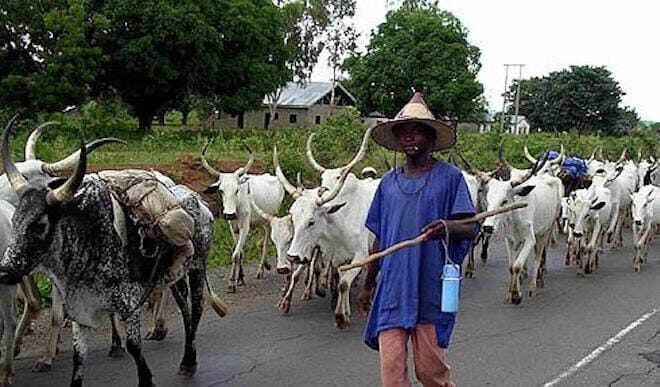THE Miyetti Allah Cattle Breeders Association of Nigeria (MACBAN) has formally petitioned the United States Congress, seeking the removal of its name from a proposed sanctions list even as US lawmakers move ahead with a full-scale investigation into allegations of religious persecution and targeted killings in Nigeria.
News Point Nigeria reports that MACBAN’s reaction comes amid growing international scrutiny following President Donald Trump’s decision to redesignate Nigeria as a Country of Particular Concern (CPC), a classification that opens the door to sanctions, visa bans and potential restrictions on US–Nigeria relations.
At a press conference on Sunday in Abuja, MACBAN President, Baba Othman Ngelzarma, said the association had dispatched a letter to the US Congress through the American embassy in Abuja, urging lawmakers to strike its name from the list of entities cited in the controversial House Resolution 860.
House Resolution 860, sponsored by U.S. Congressman Christopher Smith, seeks to impose sanctions on individuals and organisations accused of participating in or enabling violations of religious freedom in Nigeria.
The resolution groups MACBAN alongside Miyetti Allah Kautal Hore and unnamed “Fulani-ethnic militias” — placing them on the same list as Boko Haram, ISIS-West Africa, the Taliban, and the Houthis.
But MACBAN insists this classification is unjustified and dangerous.
“We reject the misleading and incomplete assertions contained in the resolution,” Ngelzarma said. “MACBAN is a lawful socio-cultural and economic association registered by the Federal Government since 1986. We are not a militia, we are not a violent organisation.”
The group said the U.S. resolution blurs critical distinctions between criminal gangs, which operate independently, and law-abiding pastoralists who are also victims of Nigeria’s deteriorating security landscape.
The association presented a decade-long record of casualties suffered by herding communities, asserting that between 2015 and 2025:
18,600 pastoralists were killed, 1.29 million were displaced, 87,543 houses were destroyed, over one million cattle were rustled or slaughtered and multiple state executives of MACBAN were assassinated for aiding security agencies
“These figures show a community under attack, not one perpetrating violence,” Ngelzarma said.
He also highlighted MACBAN’s collaborations with the Nigeria Police Force, Armed Forces, NSCDC, NIPSS, state peace-building agencies, traditional rulers and global partners such as USAID, Mercy Corps, Search for Common Ground and the Centre for Humanitarian Dialogue.
As MACBAN battles to clear its name, the U.S. Congress is gearing up for a landmark hearing on Thursday, November 20, 2025, to examine Trump’s redesignation of Nigeria as a Country of Particular Concern.
The hearing, convened by the House Subcommittee on Africa, will hold at 11:00 a.m. in Room 2172 of the Rayburn House Office Building.
Congressman Chris Smith, a long-time critic of Nigeria’s human rights record, will preside over the session.
The first panel will feature senior U.S. officials including: Jonathan Pratt, Senior Bureau Official, Bureau of African Affairs, Jacob McGee, Deputy Assistant Secretary, Bureau of Democracy, Human Rights, and Labor.
The second panel will feature: Nina Shea, Director, Centre for Religious Freedom, Bishop Wilfred Anagbe, Catholic Diocese of Makurdi and Oge Onubogu, Centre for Strategic & International Studies.
The hearing will explore rising attacks on Christian communities, alleged religiously motivated violence, and possible policy responses, including: targeted sanctions on Nigerian officials, humanitarian assistance and security partnerships.
President Donald Trump’s CPC redesignation—announced on October 31, 2025—accused Nigeria of severe violations of religious freedom, particularly the “systematic persecution of Christians.”
Trump said thousands of Christians had been killed by extremist groups and alleged that the Nigerian government had not done enough to stop the killings.
The U.S. President reportedly went further, directing the U.S. Department of War to prepare for potential action should Nigeria fail to halt attacks on Christian communities.
He also threatened to cut all aid and restrict bilateral assistance.
But MACBAN insists the U.S. resolution could stigmatise millions of pastoralists, jeopardise peace-building work, and inflame tensions in rural communities.
“MACBAN does not support, condone, harbour, finance or protect any form of criminality,” Ngelzarma stressed. “Individuals who commit crimes must face justice. But an entire community should not be criminalised.”
The association urged the US to adopt an evidence-based approach and engage local actors before making decisions with far-reaching consequences.







